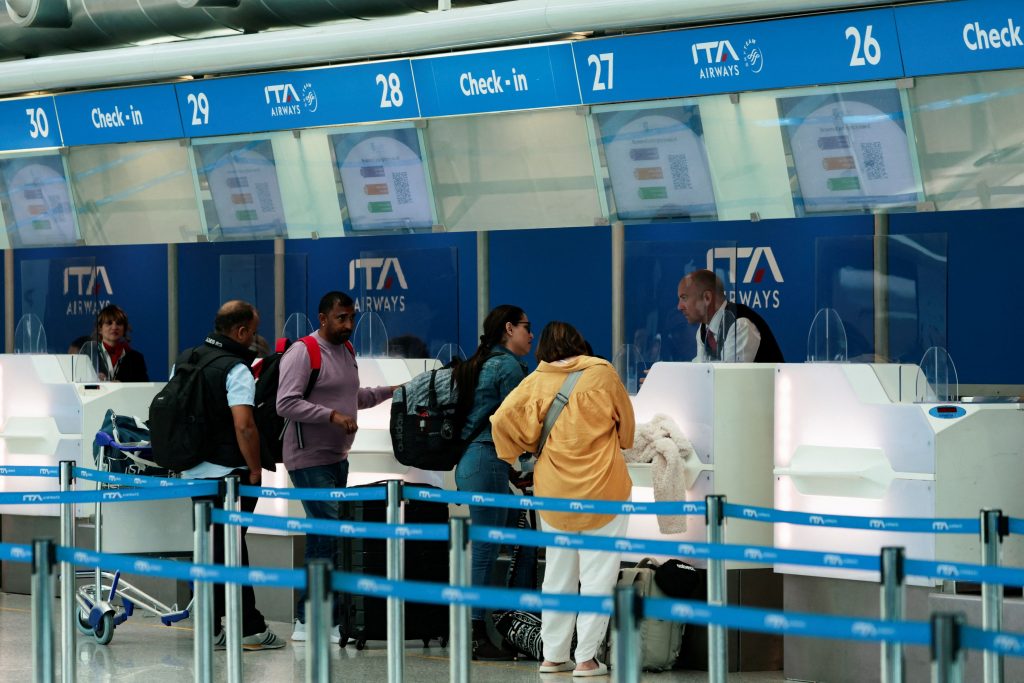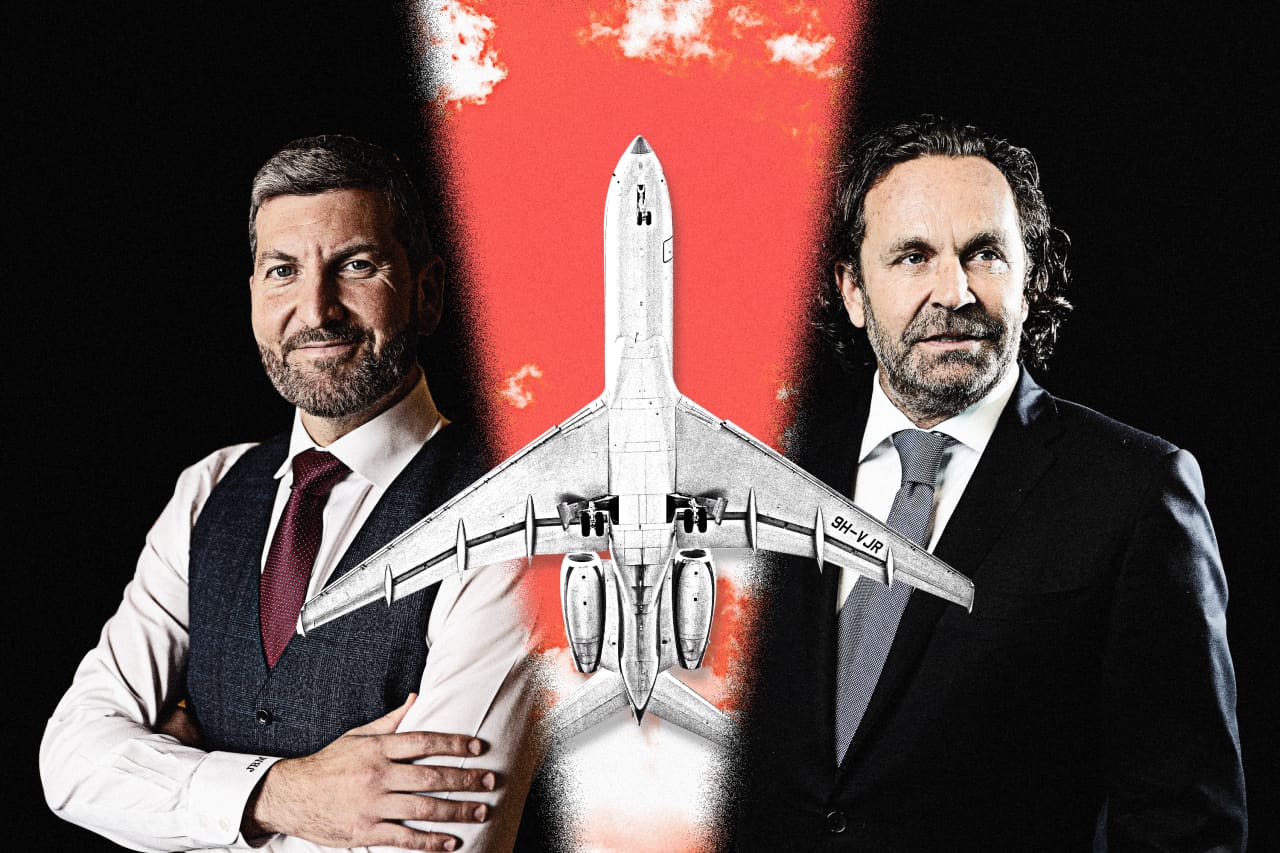John Matthews answered his doorbell in a London suburb this past February with his 4-month-old in one arm, baby spit-up on his shirt, and his toddler racing after him.
Matthews, the founder of a private-jet charter company called AirX that shuttles celebrities and executives around the world, was greeted by a stranger who handed him a letter.
It was from lawyers for his company’s much-larger rival, VistaJet. Scanning it over, Matthews realized they had his text messages. The lawyers told Matthews: Prepare to answer for them in court.
For 11 months on WhatsApp, Matthews had been texting with a handful of his most trusted staffers about VistaJet, and the ways they could spread dirt on the company.
VistaJet knew what he had been up to. The letter cited 139 pages of his WhatsApp group chat.
This wasn’t just a rivalry between competitors. Matthews had been obsessed with Thomas Flohr , VistaJet’s founder, for about a decade.
Matthews and his AirX employees had been emailing, at times anonymously, with VistaJet suppliers, bondholders, ratings firms and journalists. He and his staffers raised questions about VistaJet’s corporate structure. They called out its $4.25 billion in debt. And they portrayed Flohr as unethical and underhanded.
Flohr is a part-time race-car driver whose primary residence is a James Bond-inspired seven-story mansion in the Swiss Alps. The 64-year-old cuts a big figure in private aviation, including in 2015 being recognized by the Living Legends of Aviation. (SpaceX founder Elon Musk won the same honor in 2009.)
VistaJet has spent two decades positioning itself as an ultraluxury private-jet operator, offering clients Italian-leather cabin seats, brushed-cotton pajamas, cashmere socks, and small blankets made from the hair of baby alpacas. Its cabin hosts are trained by the British Butler Institute, a butler training school. It offers in-flight dishes designed by the celebrity chef behind Nobu, and passengers can fork out to hire actors to entertain their children during longer flights.
VistaJet aircraft have carried the likes of Brad Pitt, George Clooney, Claudia Schiffer, musician DJ Khaled, and sports stars such as Novak Djokovic and Formula One driver Charles Leclerc. Barack Obama was photographed disembarking from a VistaJet aircraft on a private trip to Kenya, while Julian Assange flew on a VistaJet plane back to his native Australia in June after a plea deal allowed him to walk free from a London prison.
VistaJet has over 350 aircraft, is second in size only to Berkshire Hathaway’s NetJets, and dwarfs not only AirX’s 17 aircraft but also most commercial airlines.
After reading the letter from the lawyers, Matthews said he took out his phone, opened the group chat that was the source of the messages, and quickly tapped out a text: “Vista seem to have my WhatsApp messages, anyone shared the group messages?”
Only one member of the group—AirX’s head of communications—failed to respond, Matthews said. That employee then requested leave. Within weeks, he resigned. (He declined to comment.)
In April, Matthews, his employees and his company were named in a lawsuit accusing them of “malevolent, negligent and egregious conduct” designed to disrupt VistaJet’s business and tarnish the company’s reputation. VistaJet’s suit, filed in Malta where AirX is based, is seeking $422 million in damages, citing the WhatsApp transcript as the primary evidence.
In a letter that Flohr sent to VistaJet bondholders that same month, he addressed what he called “malicious misrepresentations” from outsiders. “For the last 18 months, a group of individuals seeking to damage…our business has disseminated half-truths, false rumors and lies,” he wrote, according to a copy of the letter reviewed by The Wall Street Journal.
AirX hasn’t contested the existence of the WhatsApp group, nor has it denied the actions the messages describe. (Two Wall Street Journal reporters, including the author of this article, were among the journalists mentioned in the chat.) It said in its reply to the suit that VistaJet’s lawsuit is an attempt to “muzzle and ‘arm-twist’” Matthews and his employees and derided the damages figure as a “fantastical quantum.”
Matthews says he has done nothing wrong.
“It is not only reasonable but also responsible for competitors to raise warnings,” Matthews said in an email this week.
If VistaJet’s intention was to muzzle Matthews, it didn’t work. He has shifted from covertly dishing about his rival to publicly ridiculing it and issuing open challenges to Flohr on social media.
In one video posted in July under the caption “The Rebellion Strikes Back,” Matthews describes the standoff between AirX and VistaJet as if it were the latest Star Wars blockbuster.
“Thomas: I am unafraid of you; in fact, I have never felt so empowered,” he wrote in May in an open letter to Flohr titled “Challenge Accepted?” that he published on LinkedIn after VistaJet filed its lawsuit.
A-list clientele
Flohr started VistaJet in 2004 with a single aircraft. The company, now based in Dubai, bills itself as a subscription flight service. It typically flies bigger aircraft bought brand new on longer, international routes than many of its rivals, including AirX. It charged on average $17,700 per flight hour in 2022, according to its financial report from that year. The company hasn’t publicly disclosed a more recent audited annual report.
Flohr, who grew up in a rural German village where his father was a high-school teacher, now moves in some of the same social circles as his A-list clientele. For his daughter Nina’s 18th birthday , he threw a party for 300 guests that included a historical re-enactment of the rise of Communism. Actors were hired to dress as Bolshevik peasants and as Soviet soldiers on horseback. In 2021, his daughter married a Greek and Danish prince who is the godson of the late Princess Diana.
His 35,000-square-foot property in the Alps includes a movie theater, squash court, bowling alley, pizzeria, spa and a rosewood desk that was used in the Bond film “From Russia With Love.”
“I come from nothing,” Flohr said during a 2015 tour of his home for T, the New York Times style magazine. “One day you dream of having a home for generations to stay, and I think I achieved that with this house.”
Matthews’s business also started small. Matthews, 43, took the reins of the flailing AirX charter-jet company in 2011 and took out a loan to begin rebuilding it. He says his preoccupation with VistaJet started shortly after. Matthews was struggling to compete with the larger company’s pricing. So, he said, he set out to understand its business model better.
AirX derives most of its revenue selling one-off charter flights and aspires to offer privacy and comfort, but doesn’t offer the same ultraluxury amenities of its rival. Unlike VistaJet’s fleet, Matthews’ 17 aircraft are often over 20 years old, refreshed with a coat of paint and new interiors.
When VistaJet published its first bond prospectus about a decade ago, Matthews combed through the 486-page document. He found a section where VistaJet outlined how the company typically buys its aircraft from Bombardier via a separate entity owned by Flohr, positioning the executive as a middleman in the transactions. Matthews said that made it seem as if Flohr was incentivized to grow VistaJet even if it meant exposing the company to an additional financial burden.
It’s a risk that VistaJet itself flagged in its most recent bond documents, but it describes the deals as being arranged with “arm’s-length terms.” VistaJet disclosed an example of the structure, saying that it was required to pay Flohr a $1 million fee for some of the aircraft it decided to buy. Flohr has also typically collected additional money from VistaJet on the transactions, depending on the value of the planes at the time of purchase, the prospectus says.
It is unclear how profitable the arrangement has been for Flohr, but VistaJet disclosed in its audited financial statement for 2022 that it owed $81 million to Flohr at the end of 2022, most of which was related to aircraft purchases.
Flohr has vociferously pushed back against the idea that he’s doing anything wrong. The transactions associated with the recent acquisition of aircraft, he said in his April letter, were done at market value and approved by the company’s board in a session in which he did not vote. Flohr also said that he had never taken a salary or dividend from VistaJet.
Corporate-governance specialists and academics say the structure is unusual but that the rules around such related-party transactions aren’t clear-cut.
“It’s curious, it’s very cozy. It’s sort of clever, actually,” said Rob Britton, a former American Airlines executive and professor at Georgetown University’s business school.
To be sure, Britton added, VistaJet has only two shareholders—Flohr and an investor called Rhône Capital —and it hasn’t defaulted on any bond payments, so it is not clear if any investors have been harmed by the arrangement. A spokesman for Rhône, a New York-based private-equity fund, declined to comment.
VistaJet’s auditor, Ernst & Young, last year wrote in its audit of VistaJet that “a material uncertainty exists that may cast significant doubt upon the Group’s ability to continue as a going concern,” noting that at the end of 2022, its current liabilities exceeded its current assets by $1.46 billion. Vista’s net debt more than doubled in 2022, from $1.97 billion to $4.25 billion. Its debt early this year was trading at prices that indicated bondholders were concerned about default, with one issue falling to about 65 cents on the dollar in January. The same bond traded Wednesday at around 86 cents on the dollar, according to MarketAxess.
The company has since switched auditors to PricewaterhouseCoopers.
The company used the borrowed money to add more than 100 aircraft in 2022, some by acquiring smaller rivals, and to refurbish the planes to meet VistaJet’s standards, Flohr wrote in his letter. Since the going-concern warning from EY, “we have made significant progress in our financial, sales and operational strategies,” he wrote. A new audit from April contained no going-concern warnings, he said, adding that he expects VistaJet to “de-lever materially” this year.
EY and PwC declined to comment.
The fight escalates
In September 2021, Matthews’s company suffered a crisis that threatened to bring it to its knees.
Matthews received notice that Canadian airplane supplier Avmax had terminated his leases on eight planes and demanded the aircraft be grounded by the next day in preparation for their seizure.
“I couldn’t work out what on earth was going on,” Matthews said.
Matthews raced to court in Alberta, where Avmax is based, and got an emergency injunction to halt the seizure.
In a more recent legal filing in Alberta, Matthews said in an affidavit that he subsequently learned that Avmax had lined up someone else—an unnamed third party—to lease the planes at a higher price. The filing accuses Avmax’s then-chief executive of acting in bad faith by accepting deposits for AirX’s leased aircraft and taking “improper actions” that interfered with AirX’s business.
Avmax and the former CEO declined to comment.
The Alberta episode spurred Matthews, he says, to create the WhatsApp group. He picked a photo of convicted financial fraudster Bernie Madoff as its profile image and added some of his closest confidants.
Over the next 11 months, Matthews and his colleagues used the chat to discuss their plans to publicize VistaJet’s corporate structure and indebtedness, according to the WhatsApp messages in the court filing. The group chatted about conversations with VistaJet suppliers, the use of anonymous email accounts to distribute documents, and conversations with journalists.
The group repeatedly discussed how VistaJet’s challenges could benefit AirX, including by presenting an opportunity to raise its own charter rates and negotiate a higher valuation with potential investors.
VistaJet said in its legal filing in Malta that AirX’s efforts have resulted in a spate of negative media coverage, prompted customers to ask for their deposits back and made new financing harder to obtain. Suppliers have also slapped VistaJet with credit limits, and its executives have been “severely impacted” by persistent queries from journalists, staff and stakeholders.
“Even if they will likely proclaim that they are spreading such information for the common good, in reality the defendants’ true intentions are solely for financial gain,” VistaJet said in its filing.
Matthews acknowledges his motivation for continuing his campaign against Flohr is both financial and personal—even though the two men have never met.
“I have a complete vested interest for the obsession I have against him,” Matthews said. “But I hope that doesn’t make me wrong.”
Write to Benjamin Katz at ben.katz@wsj.com










